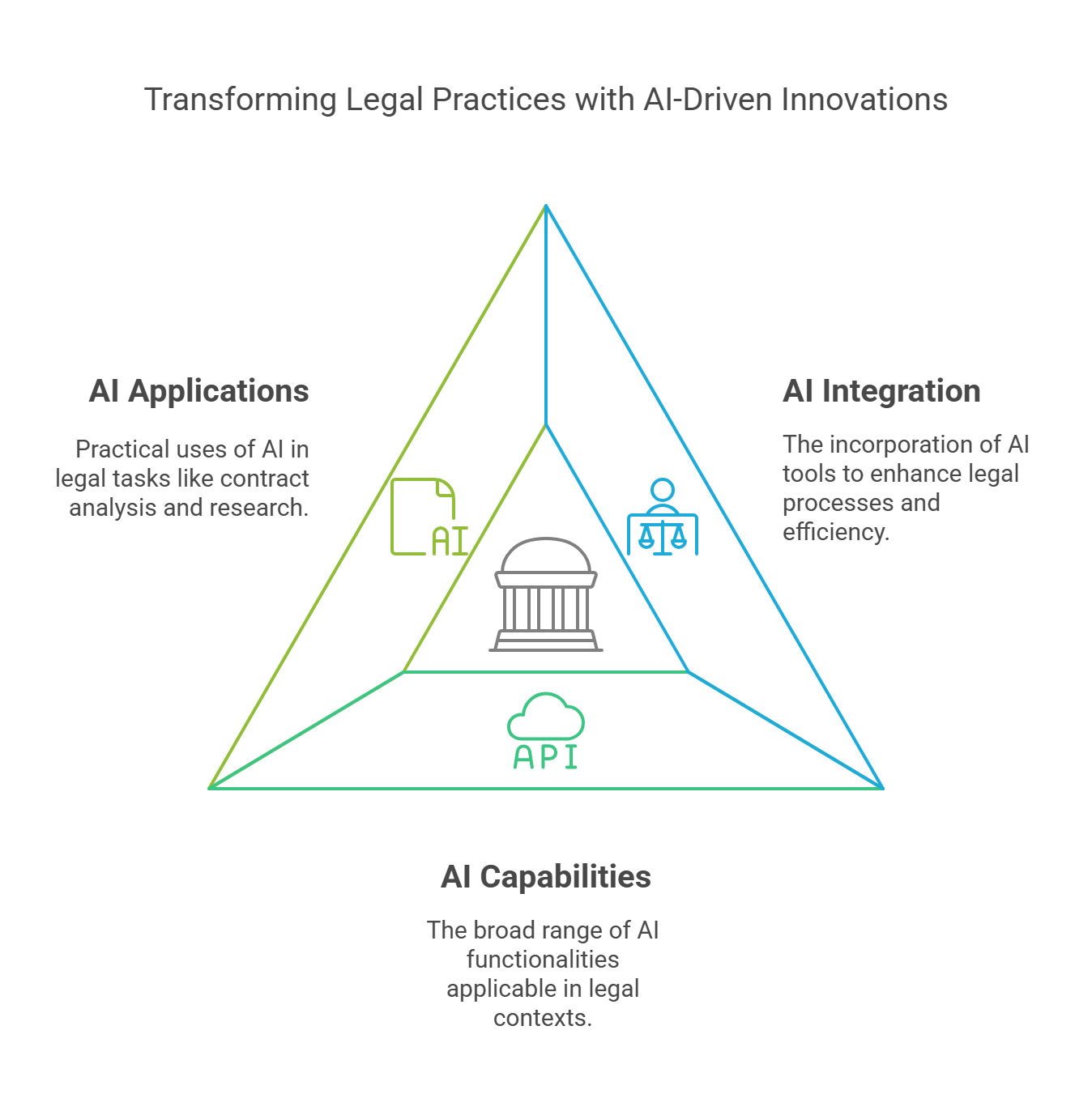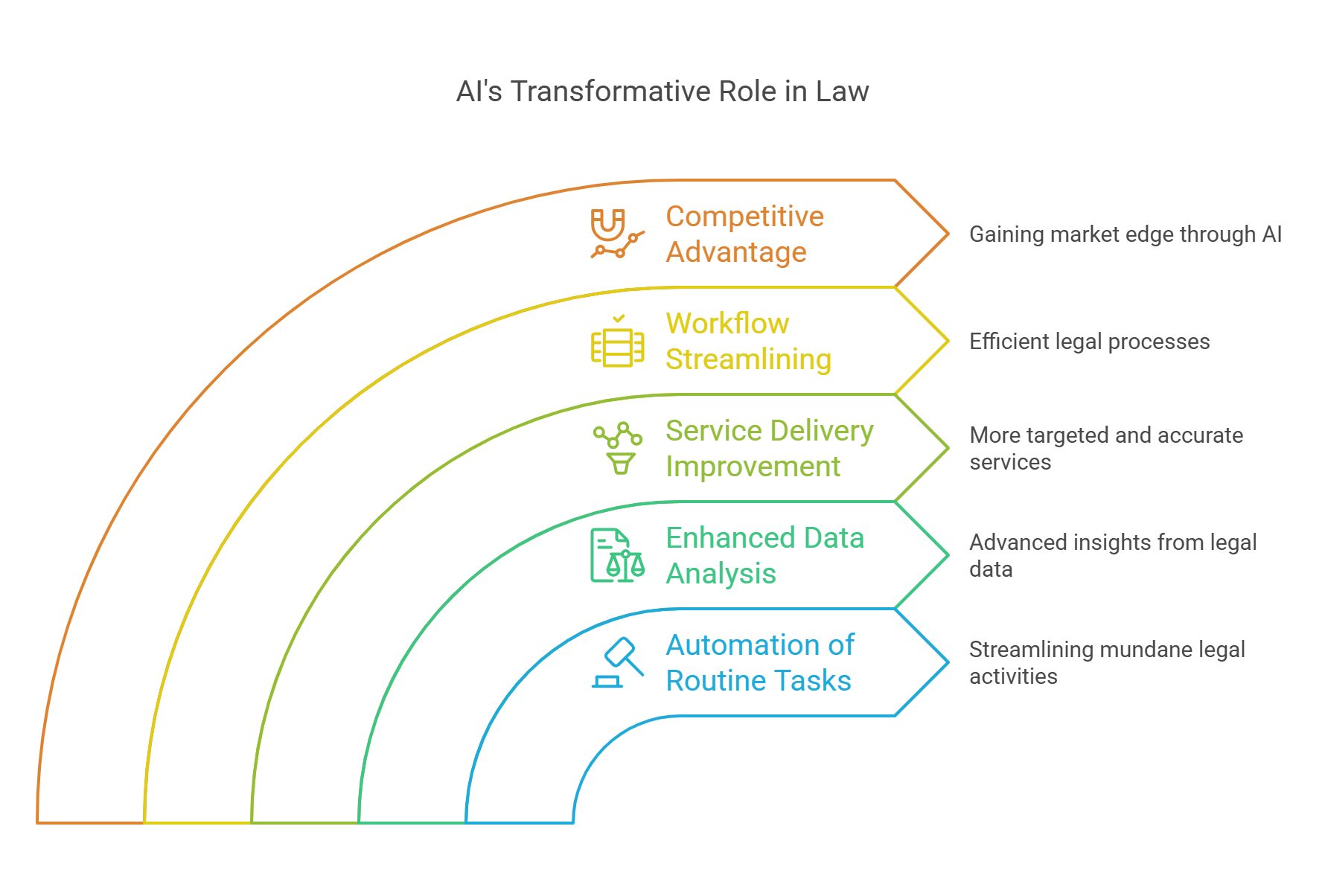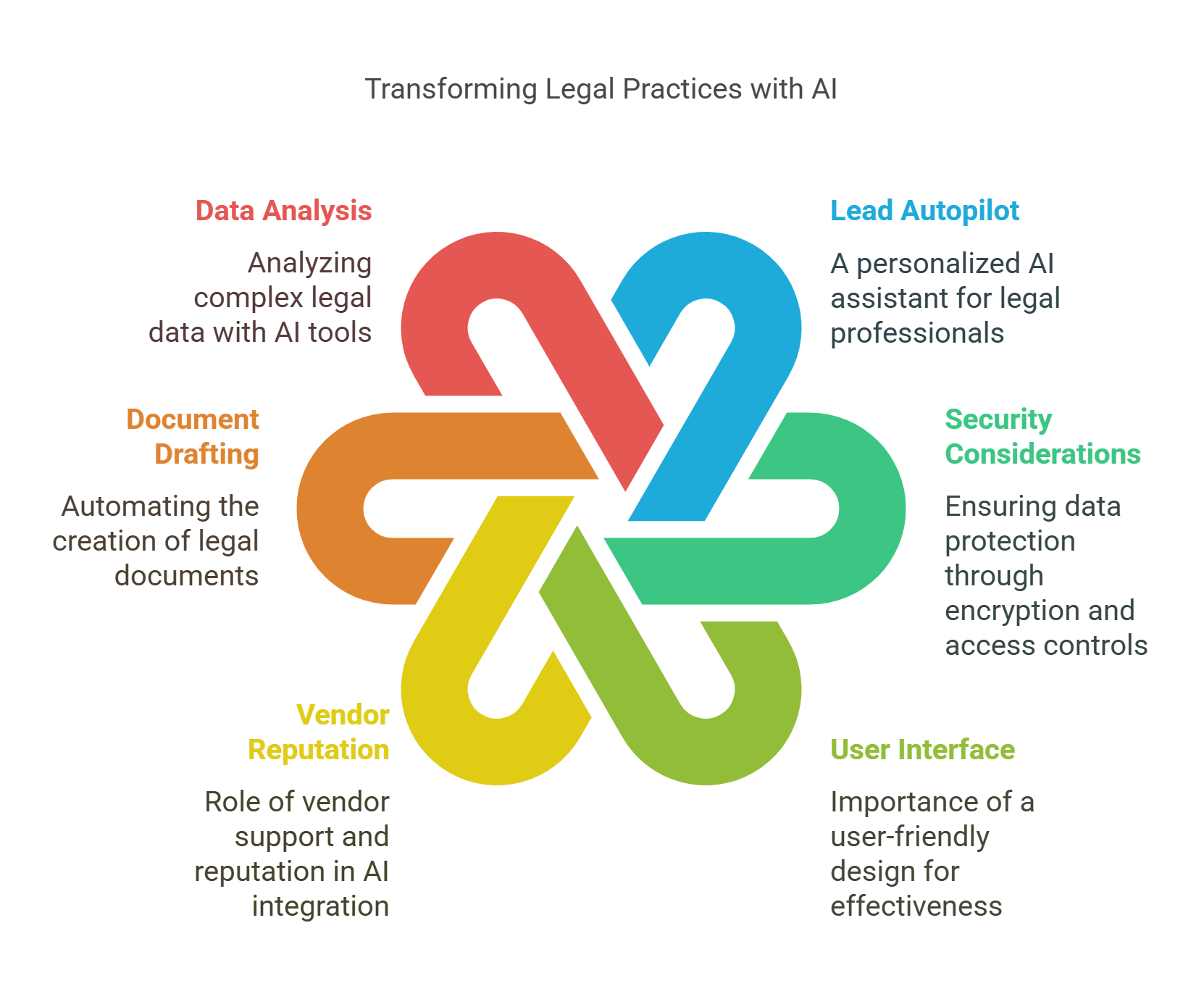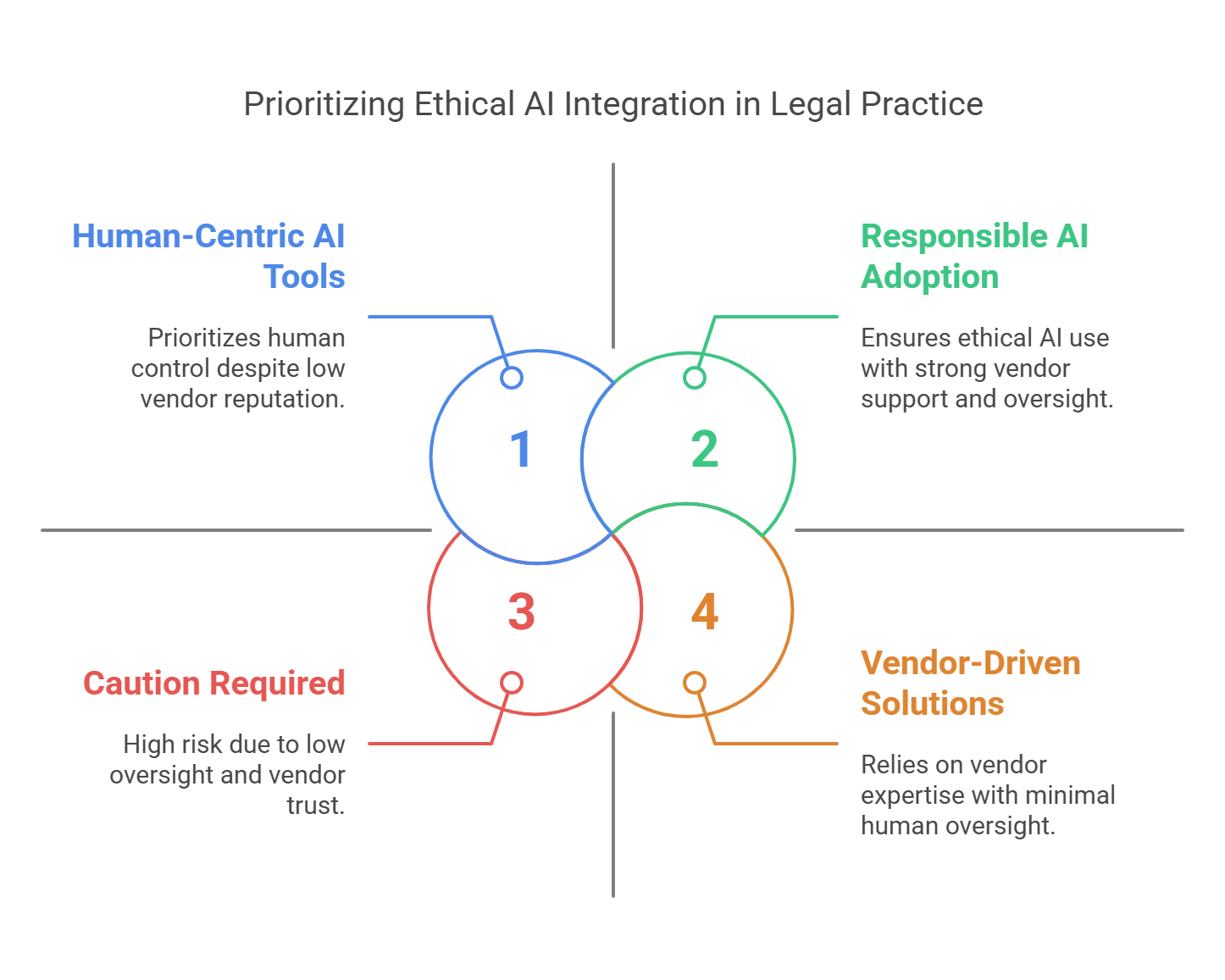Introduction to AI in Law
Artificial Intelligence (AI) is increasingly becoming a cornerstone of innovation within the legal industry, facilitating dramatic transformations in how law firms operate. By leveraging AI, firms can streamline processes, increase productivity, and reduce operational costs. The integration of AI-powered tools allows law firms to work more efficiently, pivoting their focus towards a client-centric model that enhances service delivery.
Rather than seeing AI as a replacement for the personalized touch lawyers provide, it's essential to view these tools as partners in augmenting legal practice. The right AI solutions enable legal professionals to work more effectively, freeing them from mundane tasks and enabling them to concentrate on strategic aspects of their work, ultimately fostering higher productivity and reduced expenses.
What is Artificial Intelligence?
Artificial Inteligence represents a broad category of technologies capable of simulating human-like behavior through the use of software and sophisticated algorithms. This umbrella term encompasses various functionalities that include problem solving, learning, and reasoning, which are essential for data analysis and decision-making in legal environments.
Everyday examples of AI include voice-activated assistants like Siri and Alexa, which understand and respond to user commands, as well as search engines such as Google, which utilize complex algorithms to provide relevant results based on user queries. In the context of law, AI's capabilities can extend to contract analysis, case law research, and predictive analytics, changing how legal professionals approach their work.

How is Machine Learning Different from Artificial Intelligence?
While AI serves as an all-encompassing term describing various technologies that mimic human processes, machine learning is a specific subset of AI. Machine learning involves the use of algorithms that learn from data, allowing them to automate tasks and enhance their performance over time. In legal contexts, machine learning can be instrumental in automating routine procedures, analyzing vast data sets for insights, and continuously improving systems based on new information.
Understanding the distinction between these terms is critical for law firms aiming to adopt AI technologies effectively. By implementing machine learning solutions, firms can automate numerous tasks, from filtering case precedents to flagging important emails, thereby increasing efficiency across the board.
What is Generative AI?
Generative AI refers to advanced technologies capable of producing original content, such as text, images, music, or code, in response to specific instructions. By harnessing extensive data sources, these tools can create outputs that often bear little resemblance to the input data, demonstrating a sophisticated level of understanding and creativity.
In the legal sector, generative AI applications can analyze existing case law and generate innovative legal arguments or summarize lengthy contracts. Additionally, AI technology aids legal professionals in enhancing the efficiency and quality of their legal drafting processes. By integrating such capabilities, law firms can augment their analytical processes and foster more robust legal strategies that are backed by comprehensive data insights.
The Impact of AI on the Legal Industry
AI is reshaping the legal profession dramatically, enabling firms to automate numerous routine tasks, analyze intricate legal data, and provide more targeted and accurate services. The automation of mundane activities empowers lawyers to focus on areas demanding human judgment and expertise, such as client interactions and strategic decision-making, thereby transforming the overall delivery of legal services.
AI-powered tools play an essential role in driving value for law firms, allowing them to deliver exceptional results while enhancing their operational efficiency. By streamlining workflows, firms can improve their bottom line, leading to greater client satisfaction and increased retention.
Transforming the Legal Profession
AI tools are revolutionizing various dimensions of legal work, encompassing everything from legal research and document review to litigation support. For example, machine learning algorithms can analyze legal documents at an astonishing pace, pinpointing the most relevant information and reducing the time spent on extensive reviews. Law firms utilizing AI can gain a competitive advantage in a rapidly evolving market, positioning themselves to respond quicker and more accurately to client needs.
Advanced AI tools, like Lead Autopilot, further enhance these capabilities by automating lead generation and qualification processes, ensuring that lawyers can allocate their time toward meaningful engagement rather than administrative overhead.
Future Outlook for AI in Law
The future of AI in law is incredibly promising, with ongoing advancements making AI tools progressively sophisticated and integrated into the daily workflows of law firms. The adoption of AI technologies will empower firms to enhance their service provision, realize cost reductions, and optimize their operational strategies.
Law firms that embrace AI tools will be better equipped to navigate the complexities of the modern legal landscape, positioning themselves not only as leaders in efficiency but also as innovators capable of delivering outstanding client experiences.

AI Tools for Legal Research
AI-powered legal research tools are essential for law firms aiming to enhance their research capabilities and conduct legal research with greater ease. Such tools leverage machine learning and natural language processing to sift through vast databases of legal documents and case law, enabling firms to extract valuable insights and deliver accurate outcomes.
The integration of AI in legal research does not just streamline traditional research methods but fundamentally transforms them, allowing for faster and more comprehensive exploration of legal precedents and relevant statutes.
Benefits and Challenges of AI in Legal Research
The primary advantages of employing AI in legal research include significant reductions in the time and cost associated with research activities. AI tools can automatically identify and summarize pertinent case law, allowing lawyers to focus their efforts on strategic tasks. This efficiency not only enhances productivity but also improves the quality of insights generated from legal research.
Nevertheless, it is vital to recognize the challenges associated with AI in this arena, particularly concerning ethical implications such as algorithmic bias and accuracy. Municipalities and legal professionals must remain vigilant to ensure that their AI tools are compliant with established legal standards and free from any unintended biases that could affect outcomes.
Best of AI Tools for Legal Research
Among the AI tools revolutionizing the legal landscape, Lead Autopilot stands out as a personalized AI assistant designed explicitly for legal professionals. Its capabilities enable lawyers to make informed decisions quickly, enhancing productivity while ensuring high-quality outputs. By streamlining the lead generation process and optimizing communication with clients, Lead Autopilot allows legal teams to focus on strategic engagement rather than administrative tasks.
Best Practices for Using AI in Legal Research
When considering the adoption of AI-powered tools, law firms should prioritize evaluating security and user interface considerations thoroughly. Understanding the security protocols in place, such as data encryption and access controls, is crucial in protecting sensitive client information.
Additionally, a user-friendly interface that allows for easy navigation can significantly impact the effectiveness of an AI tool. Law firms should also take into account the vendor’s reputation and the level of support they offer during the AI integration process.
Top Tool Ways Lawyers are Using AI
Legal professionals are increasingly harnessing AI to fundamentally transform how they conduct research, draft legal documents, and analyze complex legal data. By automating routine tasks, such as scheduling or data entry, AI-powered tools enable lawyers to dedicate more time to delivering high-quality services to their clients.
This technological evolution not only enhances the efficiency of individual legal practices but also fosters a culture of continuous improvement across the legal profession as a whole.

Legal Software Powered by AI: What to Look For
When selecting AI-powered legal software, law firms should pay particular attention to both security and the user interface. Evaluating a vendor’s history in providing reliable support and maintaining robust security standards is essential to safeguard confidential information.
Furthermore, the adaptability of the software can foster a more tailored approach to a firm's unique needs, enabling them to leverage technology to its fullest potential.
Evaluating Security and User Interface
The assessment of security protocols in AI-powered legal software should involve a detailed examination of measures such as data encryption, access controls, and compliance with relevant industry standards. Firms must also ensure that the user interface is intuitive and customizable, allowing lawyers to navigate the software easily and adapt it to their specific workflows.
By prioritizing these aspects, law firms can select AI solutions that not only enhance efficiency but also protect the valuable information entrusted to them by their clients.
AI in the Courtroom
As the legal landscape becomes increasingly competitive, AI-powered tools emerge as crucial allies in the courtroom, assisting law firms in mastering the complexities of litigation. These tools are not mere conveniences; they redefine the very strategies lawyers employ in and out of court.
AI-powered tools in the courtroom help streamline case preparations, offering insights derived from extensive data analysis. The ability to predict case outcomes has moved from theoretical to practical, bringing AI into the day-to-day operations of law firms with unprecedented impact.
Automating routine tasks is another triumph for AI, bestowing law firms with newfound efficiency. AI handles repetitive tasks such as document filing and case tracking, allowing legal professionals to focus more acutely on strategizing and client interactions.
The Role of AI in Litigation
AI transcends traditional methodologies, employing machine learning algorithms to delve into intricate legal data. This capability unveils patterns and correlations often overlooked by human analysis, empowering firms with novel insights into precedents and case law nuances.
- The role of AI extends to predicting case outcomes. Through pattern recognition and data extrapolation, AI delivers probabilities and scenarios, enabling legal teams to refine their litigation strategies. Such insights foster more informed decision-making, enhancing legal strategies and client advisement.
AI-Assisted Litigation: Benefits and Risks
The adoption of AI in litigation offers notable advantages including substantial reductions in time and cost. AI systems can process and analyze data at speeds unattainable by human efforts, expediting case evaluations and resource allocation.
However, alongside the benefits lie potential ethical risks—foremost among them being bias and accuracy. AI systems make determinations based on data input, and if that data reflects existing biases, there's a risk of perpetuating errors and inequities. Vigilance and accountability must be maintained to ensure AI tools are beneficial and equitable.
Ethical Considerations for AI in Legal Practice
As with any transformative technology, the deployment of legal AI in legal practice demands careful ethical consideration. Legal professionals must weigh the implications of integrating AI tools, ensuring they align with the profession’s core ethical principles.
AI tools inherently raise questions regarding bias and accuracy. They should be deployed with an awareness of these factors and a plan to mitigate potential negative impacts on legal outcomes.
Industry Guidance on the Ethical Use of Artificial Intelligence
The American Bar Association (ABA) provides invaluable guidance to law firms navigating the ethical complexities associated with AI technologies. This industry guidance serves as a crucial touchstone, helping law firms evaluate AI tools responsibly.
- Adhering to ABA guidelines ensures that AI is used not only effectively but also ethically—upholding principles of fairness, transparency, and accountability.
Responsible AI with Human Oversight
Human oversight remains an essential component of AI deployment within legal settings. Law firms must consider how AI integrates with existing workflows, ensuring that final judgments and decisions remain under human jurisdiction.
- Vendors' approaches to responsible AI are pivotal. Legal professionals should prioritize solutions designed with human oversight and accountability in mind, ensuring AI tools augment rather than undermine their practice.
Identify the Specific Needs of Your Firm
A tailored approach is crucial when integrating AI tools into a legal practice. Law firms should conduct thorough evaluations of their workflows, identifying where AI-powered tools could provide tangible benefits.
- The specific needs of clients should also inform AI tool selection. A nuanced understanding of client requirements allows law firms to deploy AI solutions that align with broader operational and strategic goals.
Consider the Vendor’s Reputation and Support
The choice of technology vendor can significantly impact the success of AI integration. Law firms must evaluate the reputation, reliability, and support systems provided by potential AI vendors.
- An emphasis on responsible AI practices and continuous support can ensure that firms not only adopt advanced tools but also sustain their efficacy and ethical standards over time.

Staying Ahead of the Curve in AI Adoption
The landscape of AI-powered tools evolves rapidly, presenting both opportunities and challenges for law firms. Staying informed about the latest developments can help firms maintain a competitive edge.
- Regularly reviewing AI advances and vendor approaches to responsible AI will enable legal professionals to leverage cutting-edge technology effectively.
The Evolution of AI in the Legal Profession
As AI technologies mature, they continue to align more closely with the complex demands of legal practice. Innovations like Lead Autopilot exemplify how AI can seamlessly integrate into the legal workflow, automating crucial processes while ensuring human oversight.
- Lead Autopilot’s unique capabilities, such as enhanced analytics and customized AI interactions, can significantly bolster a law firm’s strategic objectives. By adopting AI tools that encapsulate responsible AI practices, legal professionals can embrace advancements that optimize operations, align with ethical standards, and enhance client service.
Law firms interested in exploring how Lead Autopilot can enhance their practice should contact us to learn more about integrating cutting-edge AI solutions into their operations.